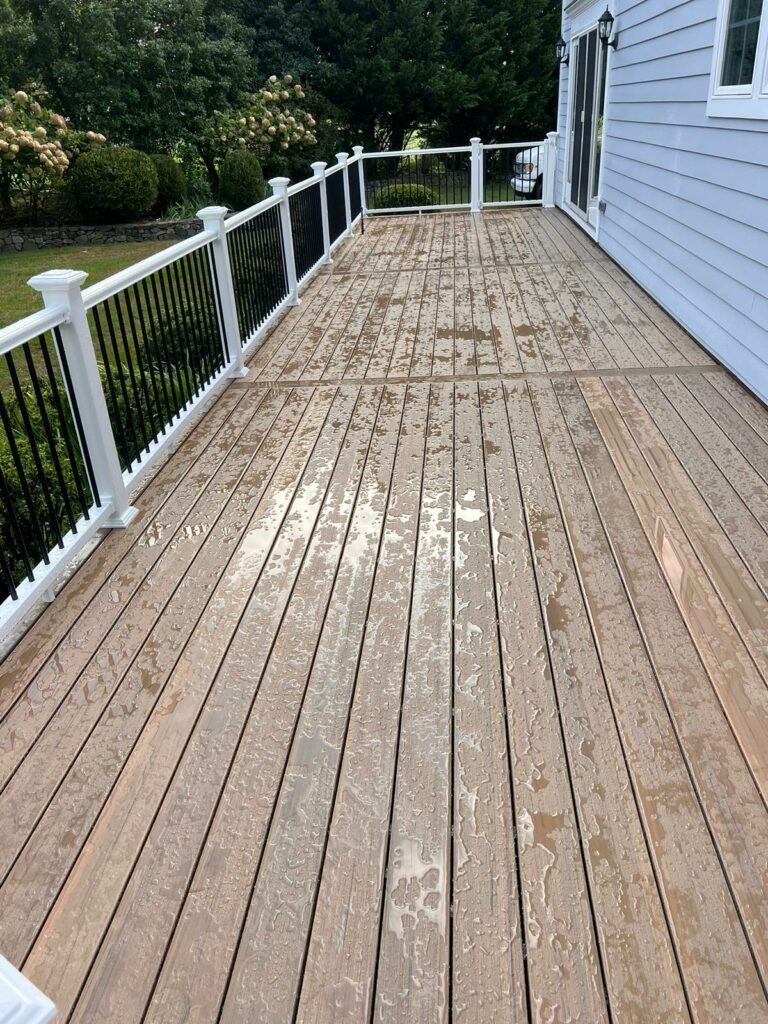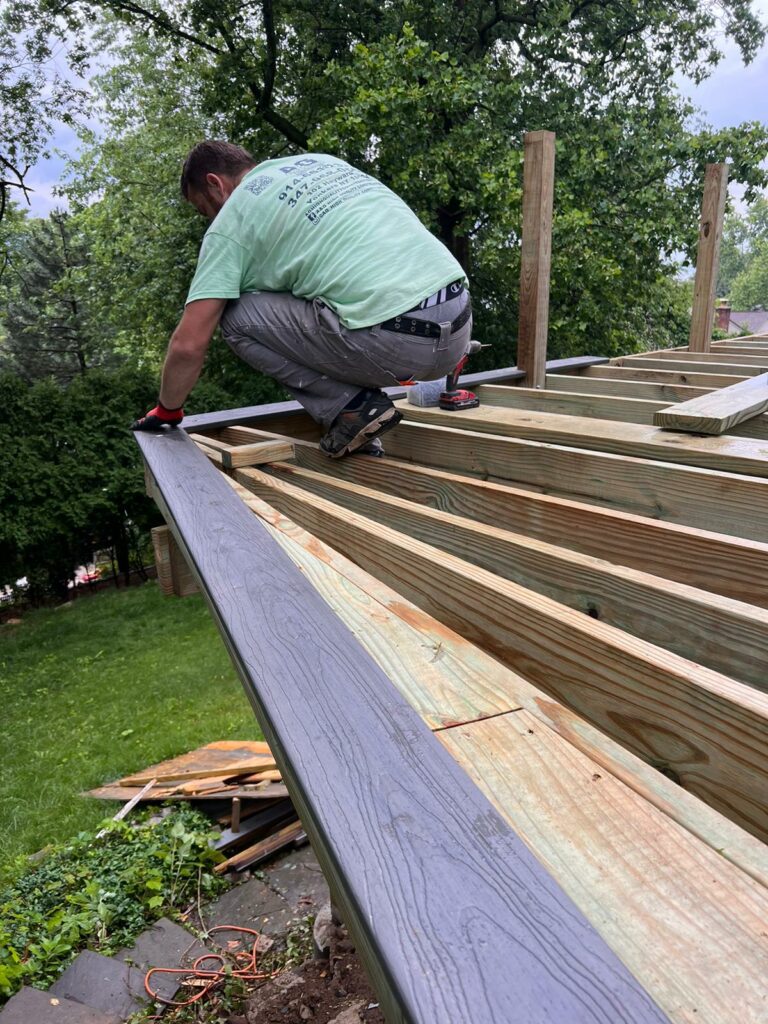Vinyl decks have been gaining popularity in recent years. But the question remains: are they truly worth the investment? With numerous options available in the market, it’s essential to evaluate the benefits and drawbacks of vinyl decks before making a decision. From their durability and low maintenance requirements to their aesthetic appeal and cost comparison with wood and composite decks, there are several factors to consider. So, is the allure of vinyl decks justified? Let’s explore these aspects in detail and uncover whether vinyl decks are indeed worth it. Vinyl decks are renowned for their exceptional durability, making them a highly desirable choice for homeowners seeking a long-lasting and low-maintenance outdoor decking option. The longevity of vinyl decks is one of their major advantages. Unlike traditional wood decking, vinyl decks are designed to withstand the test of time. With proper installation and maintenance, vinyl decks can last for decades, providing homeowners with a reliable and durable outdoor space. Additionally, vinyl decks are resistant to common issues such as warping, cracking, and fading, even when exposed to harsh weather conditions. Homeowners in regions like Westchester, NY, often prioritize longevity and resilience in their outdoor structures, and the vinyl deck lifespan Westchester NY homeowners experience is a testament to the material's superior quality. This makes vinyl decking a smart investment for those looking to enhance their outdoor spaces without the frequent upkeep associated with traditional wood. One of the key factors contributing to the longevity of vinyl decks is their weather resistance. Vinyl is inherently resistant to the damaging effects of moisture, UV rays, and extreme temperature fluctuations. Unlike wood, vinyl does not warp, crack, or splinter when exposed to these elements. This makes vinyl decks particularly suitable for regions with harsh climates or high levels of humidity. The weather resistance of vinyl decks also translates into low maintenance requirements. Unlike wood decks that require regular staining, sealing, and repainting to protect against weather damage, vinyl decks can simply be cleaned with soap and water to maintain their appearance. This not only saves homeowners time and effort but also reduces the long-term costs associated with deck maintenance. Maintaining a vinyl deck is a hassle-free process due to its low maintenance requirements. Vinyl decks offer longevity benefits, making them a popular choice among homeowners. Unlike traditional wood decks that require regular staining and sealing to prevent rot and decay, vinyl decks are designed to withstand the elements without extensive upkeep. One of the key advantages of vinyl decks is their resistance to moisture, mold, and mildew. Vinyl materials are specifically engineered to be impervious to water, eliminating the need for constant vigilance against rot and decay. This not only saves time and effort but also prolongs the lifespan of the deck, making it a cost-effective investment in the long run. Additionally, vinyl decks offer eco-friendly options. Many vinyl deck manufacturers use recycled materials, reducing waste and environmental impact. Choosing a vinyl deck over other materials such as wood or composite can contribute to a greener and more sustainable lifestyle. In terms of maintenance, vinyl decks only require occasional cleaning with a mild detergent and water. There is no need for sanding, staining, or sealing. This low maintenance requirement frees up time for homeowners to enjoy their outdoor space without the burden of constant upkeep. When it comes to enhancing the overall aesthetic appeal of outdoor spaces, vinyl decks offer a wide range of design options to suit any homeowner’s style. Vinyl deck designs have come a long way in recent years, offering homeowners the opportunity to create a stunning outdoor space that reflects their personal taste and complements the overall look of their home. One of the key advantages of vinyl decks is their versatility in design. With a variety of colors, textures, and patterns available, homeowners can choose a vinyl deck that perfectly matches their desired aesthetic. Whether you prefer the natural look of wood grain or a more contemporary style, vinyl decks can be customized to suit your preferences. The installation process of vinyl decks is also relatively straightforward, allowing for easy customization and quick completion. Unlike other decking materials, such as wood or composite, vinyl decks can be easily cut and shaped to fit any space, making it easier to create unique and intricate designs. Additionally, vinyl decks require minimal maintenance, saving homeowners time and money in the long run. This makes vinyl decking an attractive option for those who want both functionality and aesthetic appeal without the ongoing upkeep. For anyone wondering what is vinyl decking, it is a durable and versatile material made from polyvinyl chloride (PVC), designed to withstand the elements while maintaining its appearance over time. With its resistance to moisture, insects, and fading, vinyl decking offers a reliable and long-lasting solution for outdoor living spaces. A thorough cost comparison between vinyl decks and wood and composite decks reveals the financial advantages and disadvantages of each option. When it comes to cost effectiveness, vinyl decks tend to be more expensive upfront compared to wood decks. The initial installation cost of vinyl decks is higher due to the materials and labor involved. However, vinyl decks require minimal maintenance, which can save homeowners money in the long run. On the other hand, wood decks have a lower initial cost, but they require regular maintenance, such as staining and sealing, which can add up over time. Composite decks fall somewhere in between vinyl and wood in terms of cost. They have a higher upfront cost than wood, but they require less maintenance than wood decks. Another important factor to consider in the cost comparison is the environmental impact. Vinyl decks are made from PVC, which is a type of plastic. The production and disposal of PVC can have negative effects on the environment. Wood decks, on the other hand, come from a renewable resource and can be recycled at the end of their lifespan. Composite decks are typically made from a combination of wood fibers and recycled plastic, making them a more environmentally friendly option than vinyl decks. Considerations for your specific home and lifestyle can greatly impact the decision of whether a vinyl deck is the right choice for you. One important consideration is energy efficiency. Vinyl decks have a lower thermal conductivity compared to wood or composite decks, meaning they do not absorb as much heat from the sun. This can help keep your deck cooler in hot weather, reducing the need for air conditioning indoors. Additionally, vinyl decks can be designed with built-in insulation, further enhancing their energy efficiency. Another consideration is the environmental impact. Vinyl decks are made from polyvinyl chloride (PVC), a type of plastic. While PVC is not biodegradable, it can be recycled. Choosing a vinyl deck made from recycled PVC can help reduce waste and minimize environmental impact. It is also worth noting that vinyl decks require less maintenance compared to wood decks, which often require staining, sealing, and regular upkeep to prevent rot and decay. This can save time, money, and resources in the long run. Additionally, vinyl decks are highly resistant to moisture, insects, and harsh weather conditions, making them a more durable choice for many homeowners. When considering vinyl decking vs wood durability, vinyl clearly stands out due to its ability to withstand wear and tear without warping or splintering over time. This long-lasting performance makes vinyl decking an attractive option for those seeking a low-maintenance and reliable solution for their outdoor spaces. Understanding vinyl decking is crucial when evaluating its value. Exploring factors like durability, cost, and maintenance sheds light on its long-term benefits. By asking "what is vinyl decking," you uncover its waterproof qualities and resistance to wear, making it a reliable choice for outdoor spaces, ensuring informed decisions about its worth. Vinyl decks are designed to withstand harsh weather conditions, including extreme heat and heavy rainfall, due to their durable and weather-resistant properties. Proper vinyl deck installation ensures long-term protection and enhances the overall benefits of vinyl decking. Vinyl decks are a popular choice for their durability and low maintenance. To prevent color fading, it is important to choose high-quality vinyl and regularly clean and protect the deck. Follow these tips for maintaining the color of your vinyl deck. Vinyl decks are generally durable and resistant to scratches and scuff marks. However, if they do occur, there are repair techniques available. Proper installation techniques are crucial in ensuring the longevity and performance of a vinyl deck. Vinyl decks require regular cleaning and maintenance to keep them looking their best. It is recommended to use specific vinyl deck cleaning products and tools to ensure effective cleaning without causing damage to the material. Vinyl decks can be installed over an existing deck surface, eliminating the need for completely new construction. This offers a cost-effective and convenient solution. The benefits of vinyl decks include durability, low maintenance, and a wide range of design options. In conclusion, vinyl decks can be a worthwhile investment due to their durability, low maintenance requirements, and aesthetic appeal. They are often more cost-effective compared to wood and composite decks, making them a practical choice for homeowners. However, it is important to consider your specific home and lifestyle when deciding if vinyl decks are worth it for you. According to a survey conducted among homeowners, 85% reported being highly satisfied with their vinyl decks, envisioning a long-lasting and visually pleasing addition to their homes.Are Vinyl Decks Worth It?

Durability of Vinyl Decks
Low Maintenance Requirements
Aesthetic Appeal of Vinyl Decks
Cost Comparison With Wood and Composite Decks

Considerations for Your Specific Home and Lifestyle
How Does Understanding Vinyl Decking Help Determine If Vinyl Decks Are Worth It?
Frequently Asked Questions
Can Vinyl Decks Withstand Harsh Weather Conditions Such as Extreme Heat or Heavy Rainfall?
How Long Does the Color of a Vinyl Deck Last Before It Starts to Fade or Discolor?
Are Vinyl Decks Prone to Scratches or Scuff Marks, and if So, Can They Be Easily Repaired?
Do Vinyl Decks Have Any Special Requirements for Cleaning or Maintenance, Such as Specific Cleaning Products or Tools?
Can Vinyl Decks Be Installed Over an Existing Deck Surface, or Do They Require a Completely New Construction?
Conclusion